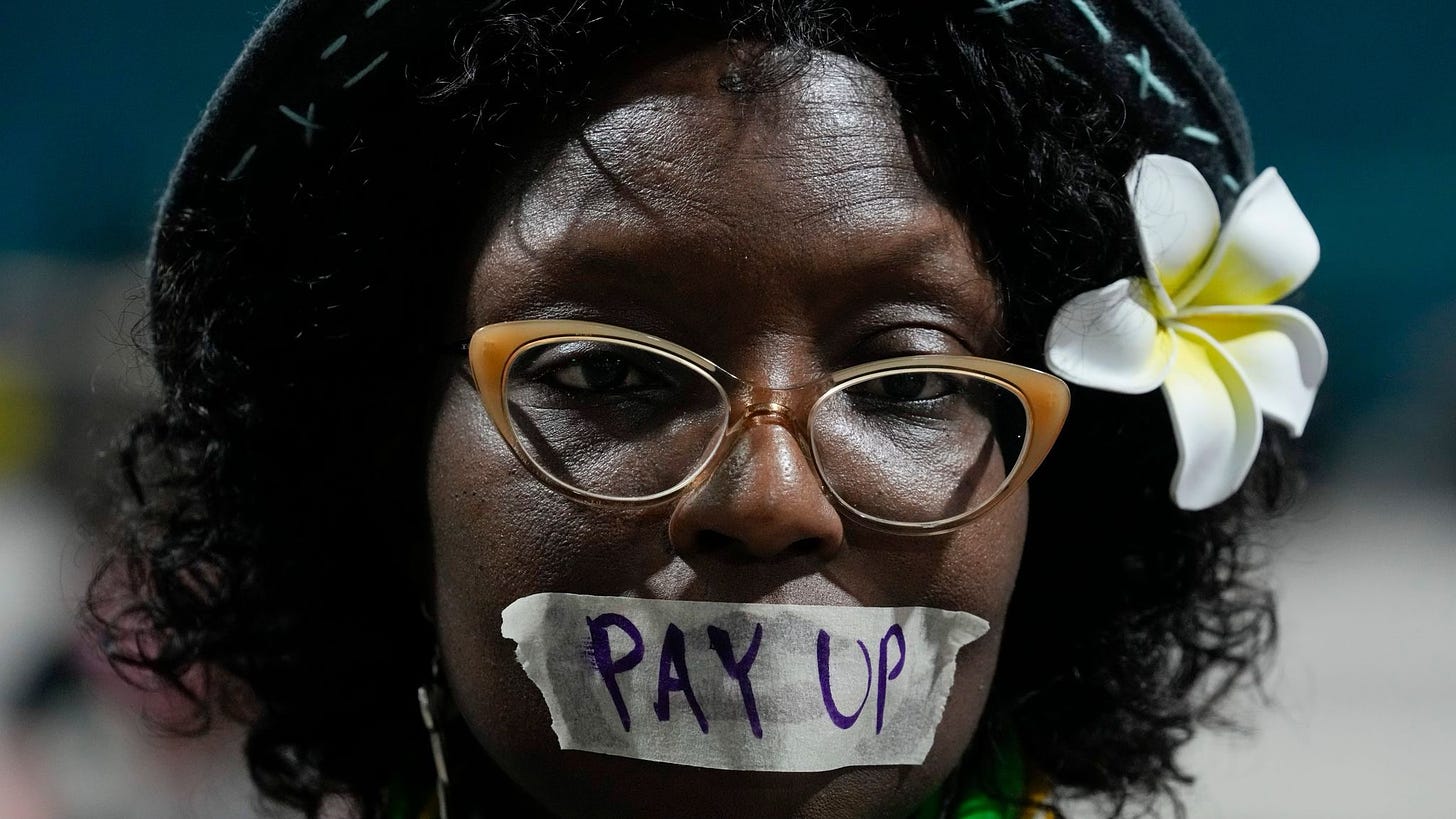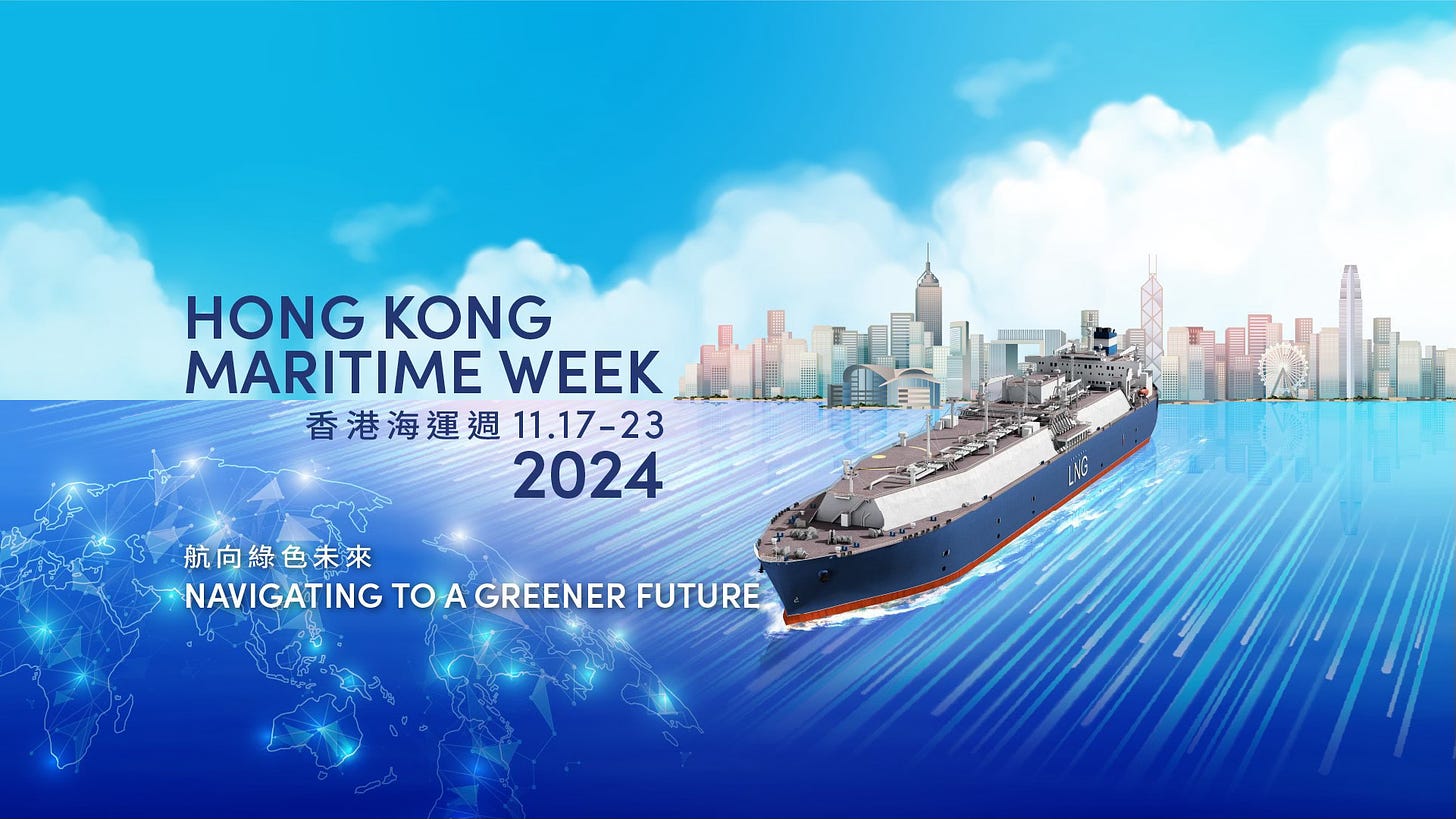COP29 Failure, End of the West, HK Shipping
Collectively COP29 agrees to “at least” $1.3 trillion in financing by 2035 to support climate-imperilled countries. West’s 500-year hegemony is over – Victor Orban, Hong Kong’s role in global shipping
COP 29 Failure
The climate summit ended with a goal to collectively provide “at least” $1.3 trillion in financing by 2035 to support climate-imperilled countries - which experts say falls short of what is needed.
By Zoya Mirza
COP29 wrapped up over the weekend with a deal to provide developing countries $300 billion in climate financing annually by 2035 to help cope with the adverse impacts of climate change. However, the commitment has been labeled as a “failure” by environmental groups and vulnerable nations alike.
The deal was announced Sunday, two days after the summit was originally scheduled to conclude, and followed two weeks of contentious discussions between negotiators present at the Baku, Azerbaijan venue.
The goal expands on a previous commitment that wealthier nations made at COP15 in 2009 to funnel $100 billion per year to climate-imperilled nations by 2020. The nations met this target two years late, in 2022, and the majority of financing came from loans, according to a recent analysis from the Organization for Economic Cooperation and Development.
Dive Insight:
The annual financing commitment is part of the Baku Finance Goal, which will seek to provide the nations most vulnerable to climate change a collective $1.3 trillion by 2035. This will be met by scaling up financial contributions from public and private sources to “at least” $300 billion per year, per the final goal.
COP29 President-designate Mukhtar Babayev called the commitment a “breakthrough,” despite his final proposal noting that the estimated climate adaptation finance needs for developing countries range between $215 billion to $387 billion annually until 2030. The final proposal also highlighted the “gap between climate finance flows and needs,” especially for the countries most impacted by climate change.
“The Baku Finance Goal represents the best possible deal we could reach, and we have pushed the donor countries as far as possible,” Babayev said in a Nov. 24 statement accompanying the final deal. “We have forever changed the global financial architecture and taken a significant step towards delivering the means to deliver a pathway to 1.5°C.”
The $300 billion pledge stands in stark contrast to the estimated price tag of meeting climate and development goals, which experts project to be as high as $1 trillion a year. The figure is based on the Independent High-Level Expert Group on Climate Finance’s 2023 report, which also found that global climate finance flows are “still too low” compared to what is needed to accelerate a clean energy transition and build resilience to climate-driven events.
Environmentalists, climate groups and developing nations were quick to lambaste the final deal.
“Powerful nations have shown no leadership, no ambition, and no, regard for the lives of billions of people on the frontlines of the climate crisis,” a bloc representing the 45 nations most vulnerable to climate change - including Bangladesh, Haiti, Ethiopia - said in a Sunday statement. “This is not just a failure; it is a betrayal.”
The World Wildlife Fund echoed this sentiment and called the finance deal “weak” and a “setback for climate action.” “The world has been let down by this weak climate finance deal,”
WWF Global Climate and Energy Lead Manuel Pulgar-Vidal said in a Nov. 24 release. “At this pivotal moment for the planet, this failure threatens to set back global efforts to tackle the climate crisis. And it risks leaving vulnerable communities exposed to an onslaught of escalating climate catastrophes.”
UN Secretary-General António Guterres also issued a statement Saturday, a few hours before the final deal was announced, and said he had “hoped for a more ambitious outcome - on both finance and mitigation.”
https://www.esgdive.com/news/cop29-concludes-with-300b-climate-finance-deal-critics-deem-as-a-failure/733930/
West’s 500-year hegemony is over – Orban
The West’s 500-year global hegemony is over and the future will belong to Eurasia, Hungarian Prime Minister Viktor Orban has stated.
By Victor Orban
The idea that “the whole world should be organized on a Western model” and that nations will be willing to join it “in exchange for economic and financial benefits” has failed, Orban said at the Eurasia Forum in Budapest on Thursday.
The Western world has been challenged from the East, the Hungarian leader declared, adding that the “next period will be the century of Eurasia.”
“Five-hundred years of the civilisational dominance of the West has come to an end,”Orban said.
According to the Hungarian leader, Asian countries have become stronger and proved they are capable of “rising, existing, and lasting as independent centers of economic and political power.” They now have both a demographic and technological advantage over their Western peers, he claimed.
As a result, the center of the world economy has shifted to the East, where economies are growing four times faster than the Western ones, Orban said. “The added value of Western industry accounts for 40% of the world, and that of Eastern industry for 50%. This is the new reality.”
While Asia accounts for 70% of the global population and has a share of 70% in the world economy, the EU has emerged as the “number one loser” in the changing reality, according to Orban. He claimed that the West has also “suffocated” in its own environment, facing challenges such as migration, gender ideology, ethnic conflicts, and the Russia-Ukraine crisis.
“It is understandably difficult for Western leaders to give up the sense of superiority to which they are accustomed, that we are the smartest, the most beautiful, the most developed, and the richest,” Orban argued.
According to the Hungarian leader, the Western elites have arranged themselves to protect the “status quo of the old glory,” which will eventually lead to an economic and political blockade.
Russian President Vladimir Putin has also repeatedly stated that humanity is moving away from hegemony towards multipolarity. Earlier this month, he said that the era of Western elites being able to exploit other nations and other peoples across the world is coming to an end.
Addressing the Valdai Forum in Sochi, the Russian president said “old hegemons” who had become accustomed to ruling over the world as they did during colonial times see that they are no longer being listened to. Putin also warned that the West’s beliefs about its own exceptionalism could potentially “lead to a global tragedy.”
https://www.rt.com/news/607982-west-hegemony-over-orban/
Hong Kong’s role in global ship finance
The city has plenty of core strengths when it comes to providing capital to shipping.
By Splash247
Hong Kong has a long tradition of providing shipping finance and progress has recently been made to attract new owners, leasing companies and managers to set up business in the territory.
As an international financial hub, the so-called Fragrant Harbour has a significant concentration of banks that provide ship finance to the local sector, as well as foreign shipowners and shipyards. Some of the world’s leading shipping lenders, such as HSH Nordbank, Credit Agricole, Export-Import Bank of China and Societe Generale, have established a presence in Hong Kong.
“Hong Kong’s economic success has its origin in shipping and trade, whose combination initiated its growth as a global financial centre and a gateway where east meets west. Clearly, wider integration of financial services with the maritime industry would help attract more commercial principals to Hong Kong,” says Richard Hext, chairman of Vanmar Shipping.
Hong Kong’s banking infrastructure and diverse funding routes indicate that it has the potential to thrive as a global maritime finance centre. In addition to traditional shipping finance, the city has created a diverse and lively alternative financing sector, which includes a variety of leasing houses, private equity and hedge funds to fill the voids left by traditional shipping finance.
Hong Kong can attract more investment in sustainable maritime solutions
According to the Hong Kong Monetary Authority (HKMA) figures in June 2023, the total amount of shipping loans and advances exceeded $10bn, accounting for 1.4% of loans and advances for use in Hong Kong—a number expected to likely grow as the city continues to make changes towards green practices and projects concerning the sustainable development of its maritime industry.
Business groups and local government have been raising Hong Kong’s profile of the shipping sector for some time, suggesting several measures, including tax incentives and so-called green loans, that would encourage greater competition in the region.
Launched in May 2021 and extended this year to 2027, the Green and Sustainable Finance Grant Scheme provides subsidies for the costs associated with eligible green and sustainable bond and loan issuances in Hong Kong. Administered by the HKMA, the scheme’s scope was extended to include subsidies for transition bonds and loans to encourage industries in the region to utilise Hong Kong’s transition financing platform as they advance towards decarbonisation.
“The government’s initiatives to develop a green maritime fuel bunkering centre and promote sustainable financing will enhance Hong Kong’s status as a leading center for ship finance. By capitalising on these trends, Hong Kong can attract more investment in sustainable maritime solutions,” notes Biju Narayanan, deputy general manager at Wah Kwong Ship Management, part of one of Hong Kong’s most important legacy shipowners.
In May this year, HKMA also published the Hong Kong Taxonomy for Sustainable Finance, which essentially provides a framework for classifying green and sustainable activities for voluntary use by industry to reduce the risk of greenwashing. It may, for example, be used for labelling of green bonds, classification of green loans, as well as supporting specific reporting for the shipping sector.
“As environmental sustainability becomes increasingly important in the maritime industry, Hong Kong can leverage its position as a leading center for green finance to support environmentally friendly initiatives within the shipping sector,” adds Gautam Chellaram, executive chairman at Hong Kong owner KC Maritime.
With the leasing market taking off substantially in Asia, particularly in China, most shipping experts believe this can be seen as beneficial to Hong Kong, and that combination of PRC lessors and banks presents an opportunity for the city.
“Hong Kong’s role in global ship finance will continue to progress well, especially as it is China’s national policy to continue to consolidate Hong Kong’s position as an international finance, shipping and trade centre,” says Hext.
Firoze Mirza, managing director of BSM Hong Kong, part of the Bernhard Schulte Shipmanagement empire, agrees that the city’s ship lending climate is likely to move in the right direction with the growing influence of Chinese leasing companies, who have become significant players in the maritime finance sector, providing substantial funding for ship acquisitions and operations.
“As these companies continue to expand, Hong Kong can serve as a key financial hub for their activities,” he adds.
Most recently, Hong Kong announced the reconstitution of the Hong Kong Maritime and Port Board to support the government in policy implementation and to promote the sustainable development of its maritime industry. Furthermore, in October, Hong Kong’s International Maritime Centre (IMC) announced the creation of the Hong Kong Chamber of Shipping—a big step forward in boosting Hong Kong as an international maritime hub, according to Hong Kong-based lawyers at Hill Dickinson.
Of particular note, the establishment of the chamber involves major key industry players, such as COSCO, China Merchants Energy Shipping, Sinopec, and PetroChina, amongst others.
KC Maritime’s Chellaram reckons Hong Kong’s role in global ship finance is likely to progress confidently as its expertise in areas such as banking, investment, insurance, and asset management provides a strong foundation for growth. He also finds that the city’s access to international capital markets and its extensive network of financial institutions make it an attractive location for ship financing transactions, and that in addition to that, Hong Kong has a stable legal system and regulatory framework that promotes transparency, security, and investor protection.
Operational, financial, legal, and other forms of support make up Hong Kong’s status as a global maritime hub rather than just a port, according to lawyers at Hill Dickinson.
“As the Hong Kong government and industry stakeholders consistently make steps towards positive developments and advancement of Hong Kong’s unique offerings, it will only continue to solidify itself as a full service shipping centre,” they say in an emailed response.
“There are very, very few cities in the world that have strengths in all three areas – finance, shipping, and trade. I have every confidence that Hong Kong will continue to do well, with core strengths in all these three areas,” concludes Vanmar’s chairman, Hext.






